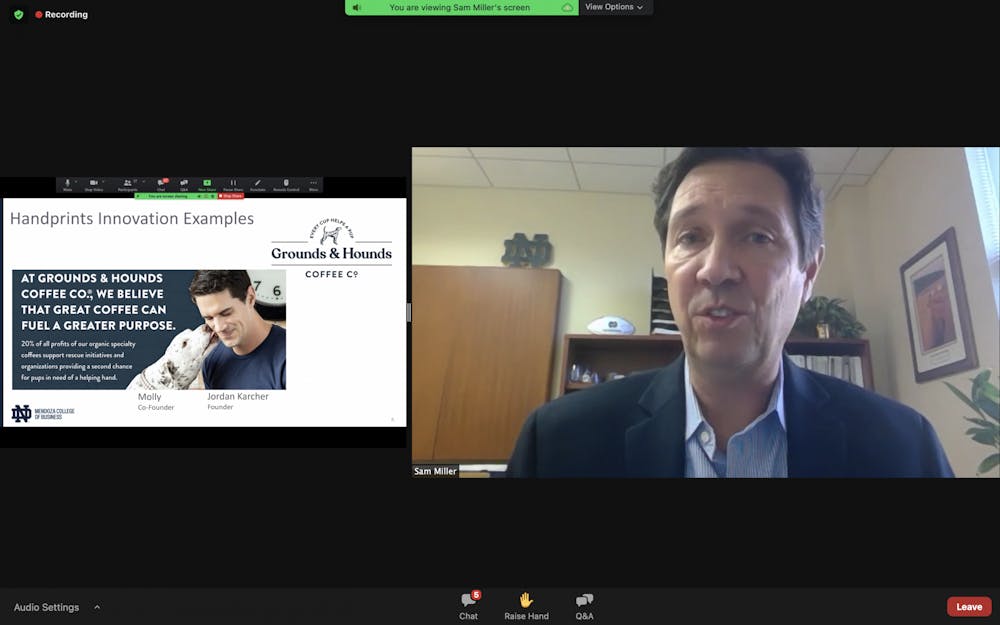The Ball State College of Health and the American Dairy Association, Indiana Inc. sponsored “Creating a Sustainable Society,” a webinar series on modern sustainability practices, Oct. 26. With speakers from multiple areas of expertise including architecture, agriculture and business, the series aims to explain the problems and solutions being implemented across the world to combat climate change and unsustainable industry practices.
The webinar hosted was the second in a three part series and featured three sustainability focused presentations. The first speaker, Robert Koester, Ball State professor of architecture, is a Leadership in Energy and Environmental Design (LEED) accredited professional, as well as the founding director of the Academy for Sustainability and the Center for Energy Research/Education/Service (CERES) on campus.
Throughout his career, Koester has studied and taught energy-efficient building practices and how they can be implemented. Koester said constructing new buildings to be environmentally friendly will help reduce the carbon footprint, but not solve it altogether.
“The biggest opportunity we have in the future is retrofitting all the existing building stock, “ Koester said. “If you look at the numbers of how many new buildings are likely to be constructed compared to how many that already exist, it's the retrofit ... that's the golden opportunity.”
Additionally, Koester spoke about the benefits of green buildings and how those benefits go beyond the materials used to construct them. Koester said it is advantageous for the occupants of a building and the environment to implement green building practices.
“[LEED] has a positive impact on performance, productivity and value,” Koester said. “Increased performance in hospitals has folks getting out of the rooms earlier, recovering more quickly from surgery and such because they have views of nature and better, healthy air to breathe.”
At the panel, Erin Fitzgerald, CEO of U.S. Farmers & Ranchers in Action (USFRA), also spoke. Fitzgerald represents members of the agricultural industry who are trying to focus on sustainable practices. Her work in the dairy industry prior to working for USFRA led to a voluntary sustainability push that adopted the goal of a 25-percent carbon footprint reduction by 2020.
“[The agricultural industry] is truly living the reality of climate change,” Fitzgerald said. “Increasingly, over the last eight to 10 harvest seasons, our farms have seen extreme and episodic events.”
Fitzgerald said every hour, 83 acres of farmland is consumed for urban development. She additionally spoke at the panel about the benefits undeveloped land has at combating the carbon footprint.
“I get excited when I think about land, air, water — these [are] things that we care about because 48 percent of the landmass in the United States is in the hands of 2 million farmers,” Fitzgerald said. “That is where 70 percent of all water is managed in the United States — 90 percent of all rain and snow fall on these lands.”
As part of her presentation, Fitzgerald displayed a video showing how farmers are struggling with climate change. Fitzgerald said the same farm displayed in the video was hit by two tornadoes a few months after they had filmed there.
“Fifteen percent of the American workforce is connected to food and agriculture, and I truly believe that putting our strength to work can be a force for [good],” Fitzgerald said.
The final speaker of the webinar was Sam Miller, director of Undergraduate Studies for Innovation & Entrepreneurship at the University of Notre Dame. During the event, Miller spoke about the entrepreneurial opportunities that focus on reuse rather than reduction.
“There's a new way of looking at [sustainability] that I'm a huge fan of — rather than focusing on squeezing out waste and inefficiency and minimizing our footprint which will, let's face it, boot prints in the garden are still harmful, right?,” Miller said. “Even if they're smaller boots, but handprints on the other hand — healing hands laid upon the system that is in peril — generates wellbeing.”
Miller said, though sustainability should remain important, reuse and adaptation of the problem may also be a healthy solution for the environment. He then shared examples of companies around the United States that are employing innovative techniques to reuse rather than reduce.
The trio of panelists then took questions from viewers for 10 minutes before the webinar ended. There is no current date set for the next part in the webinar series.
Contact Eli Houser with comments at ejhouser@bsu.edu.





